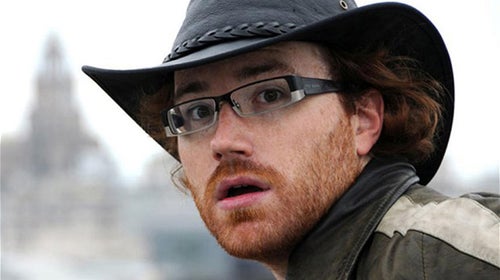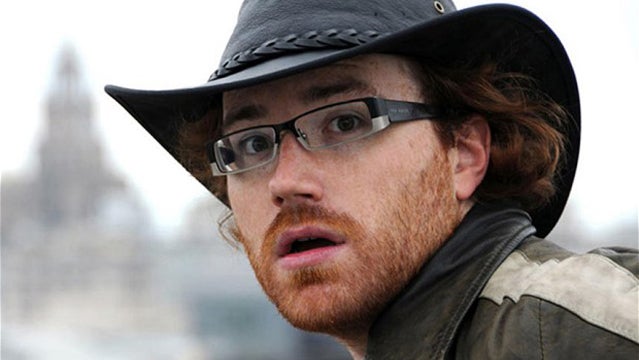Just last week, Graham Hughes became the first person to visit every country on earth without flying. After almost four years of travel, the 33-year-old from Liverpool, England, set foot in his 201st and final country, South Sudan. When he began his challenge, the country did not even exist, but now it represents the crowning glory of a long and frustrating journey.
It started as a mad dash, one-year trip, back to Australia to be with his girlfriend, captured on the TV show, Graham’s World, on the National Geographic ���ϳԹ��� Channel. But things did not turn out quite as planned. Hughes broke up with his girlfriend, the show ended, and the journey took almost four times as long as intended, but he has finally achieved his goal.
Hughes caught the travel bug early, visiting Eastern Europe with his family as the Iron Curtain was coming down, and has not really stopped since. He does not, however, really have the look of a modern day adventurer. There’s no army physique or weathered features, just a typical looking English guy in a fedora, the hat made famous by Indiana Jones. Indeed, Hughes has dubbed himself the “Thinking Woman’s Indiana Jones,” but it is another one of his fictional role models that he most resembles, Phileas Fogg. The 19th-century protagonist of Jules Verne’s Around the World in 80 Days was an unflappable charmer and schemer, able to think on his feet and talk his way around the world. Like Fogg, Hughes will return to Liverpool by boat, having succeeded in a scheme, very much in the vein of a late Victorian adventurer.
Here, Hughes tells us why the United States was one of the hardest places to enter, what pieces of equipment have been indispensable to him over the past four years, and what he plans to do if new countries are created.
Why did you embark on this journey?
I think it’s the same sort of reason people give for Everest: because it’s there. The challenge was there and no one had done it before. It was a Guinness World Record I knew that I had the ability to achieve and I thought it was possible. I’d traveled before starting this and I wanted to do at least one amazing thing in my life—and now I’ve done it.
You’ve said it was a decade-long dream. How did it come to fruition?
I got the concept for it when I went backpacking in 2002. I’d bought an around the world ticket and went to a lot of places. I had the most amazing experience. I said after that, Would it be possible to get to every country in the world without flying?
Throughout the 2000s, as the world was getting more peaceful and wars were ending in West Africa and Central Africa, I realized the world was getting a bit more easy to get around. By 2008, I realized I could do this in the next couple of years. I spoke to people at Lonely Planet Television in Australia and they really liked it and said you could probably do it. They commissioned me to make a TV series that was on National Geographic a couple of years ago, the first year of my adventures.
It’s taken almost four years to do. Did you ever think about quitting at any point?
I never thought about quitting. I had some difficulty last year because my sister passed away. After that I didn’t want to quit, but I wanted someone to take the reins and sort of deal with the complicated stuff and arrange things for me. For the whole trip I’ve been a kind of one-man band. It was a lot of responsibility to keep it going, but there wasn’t a point where I thought I was going to give up. I felt like it would be letting so many people down, people who had helped me on the journey.
Did you have any indispensable bits of equipment that kept you company throughout your travels?
My GPS logger is still with me. My trusty camcorder has been with me all the way. There are bits of equipment that really are indispensable when you’re traveling, like a Swiss Army Knife, wet wipes, a bank card, and a passport. But I travel pretty light.
Which was your favorite country?
A little island state called Palau.
Which was the hardest country to get in to?
The U.S.A. now, because I need some crazy visa! But other than that, the Seychelles because of the Somali pirate situation. I tried from about seven different places in the world to get to the Seychelles before I actually cracked it.
What was the issue with the U.S.?
I was on a ship going to Micronesia and Palau. It stopped in Guam, which is part of the U.S. commonwealth, but they wouldn’t let me off the ship. They said I needed a special visa waiver that costs $100 and I had to apply for it three days in advance. How is that not a visa?
What was the most dangerous experience or place?
I was in Senegal and I had to get some fishermen to take me over to Cape Verde on a pirogue, a wooden canoe with an outboard motor on it. I was on it for four days in the open ocean with no radio, no distress signal, no satellite phone, and no means of communication if anything went wrong.
Was it terrifying?
It was fine, I suppose. There was no storm or anything. I watched the movie The Perfect Storm a few weeks afterwards. If I’d watched it before, it might have been a different story.
Who were the friendliest immigration officials?
Mauritius was OK. They were pleased to see me. Going into Afghanistan, the guy was laughing. The border guard asked me what I was doing there. I said, “I’m a tourist.” He said, “You’re no terrorist, we have too many terrorists here.” That kind of thing. Some places people have been really welcoming. In Sierra Leone, the guy on the border basically gave me a hug because I’m British. It was because of the conflict there that was ended in 2002. He said the British saved his life.
What aspect of this journey would you consider your greatest achievement beyond the title and the record?
Not going home in four years—that’s a pretty good achievement! I think having the determination to see it through to the end when things got very difficult. In the first two years, I traveled through 184 countries. In the last two years, I’ve been to 17. That’s because they’re all islands in the middle of nowhere. Or places like the Seychelles and the Maldives that are in pirate areas.
The record might not be static. Are you scanning the map to look at the potential for new countries to come into existence?
Yes. I want to do this for the rest of my life. The idea is that every time a new country gets created, I go and visit it overland. I’ll take three or four months out of my life to go and do that. I kind of like that idea. I’m keeping an eye on things.
Are you driven by the idea of fame and creating attention as an adventurer?
Long term I want to make feature films and tell stories, so that’s not that important to me. I do like that idea, but it’s not the main reason I did this. I did this more than anything because I wanted to get in the Guinness Book of World Records, and it had never been done before, and it was something that I’m good at. I’m really good at travellng! I don’t get ill when I travel, I can sleep anywhere. I’m great about waking up when I need to get on a train. I seem to be naturally adapted very well to this kind of lifestyle.
Do you have any role models as an adventurer or a traveller?
My role models are obviously Phileas Fogg, Michael Palin, and my father. Those are my inspirations.
Your journey was different from most people’s experience of travel. How meaningful is as a travel experience when you constantly have to think about the next country or the next challenge?
Obviously, there’s a difference between traveling for the sake of traveling and going on holiday because you need to relax from work. I don’t feel like I’ve been on holiday for four years at all. I feel like I’ve been working for four years toward something.
If you want to sit on a beach and relax, that’s fair enough. I get a bit annoyed when fellow travelers will tell you that you’re not doing it right. Just because you didn’t go to this hut in Lesotho, you’ve never really experienced Southern Africa. Come on, seriously? Everybody has his or her own experiences of travel. Travel is a very subjective thing. I don’t think there is a right way to do it and a wrong way to do it. I just think there’s a way that you enjoy and I actually enjoy this.
What’s next for you?
I want to do some more TV shows. I enjoyed doing the show for National Geographic. I like telling stories. At the end of the day, I get a random email from some person halfway around the world, saying they’ve been inspired by my travels.


